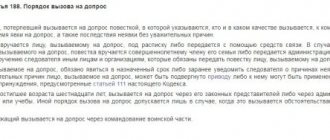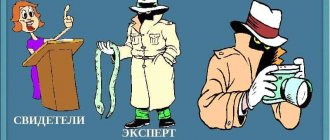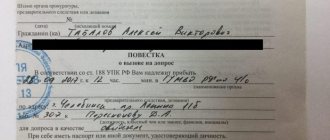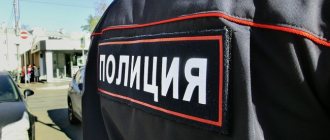A minor under 16 years of age can be summoned for questioning through his parents or educational institution. Notification of the interrogation may come in the form of a summons or by telephone. The agenda will display two names: the child's and the adult's.
If you believe that your child may be in danger, be sure to send him or her for questioning to a qualified defense lawyer - a juvenile defense lawyer.
Do you want to figure it out, but don’t have time to read the article? Lawyers will help
Entrust the task to professionals. Lawyers will complete the order at the cost you specify
76 lawyers on RTIGER.com can help with this issue
Solve the issue >
How is the interrogation going?
In order for the interrogation of a minor to be most effective, it is important to pay attention to the location and preparation. The investigator faces a number of questions:
- Where is it better to conduct the interrogation - at the place of investigation or in an environment familiar to the child. When resolving this issue, they take into account the age of the minor. For kids, familiar surroundings are preferred, and for teenagers from 14 to 16 years old, the opposite is true. In some situations, questioning at the scene of an incident is acceptable: this is done after a significant amount of time has passed after the event or to establish precise details.
- Choose a day and time for the interrogation. Due to the peculiarities of the child’s psyche, the interrogation should be carried out as soon as possible. The impressions of the incident are superimposed on new events, which over time displace past, and especially unpleasant, memories from memory. It is also important that the child does not succumb to the influence of an adult who benefits from distorting the event.
- Make a psychological portrait of a minor. In order to establish psychological contact with a teenager, the investigator can communicate with parents and teachers before the interrogation. Find out your social circle and interests.
In terms of preparing to interview a minor, it is important that the investigator plan his or her time. It is unacceptable for a child to wait in the corridor.
The law sets limits on the time of interrogation. A teenager over the age of 14 cannot be interrogated for more than 4 hours a day. A child under seven years of age cannot be interrogated without a break for more than 30 minutes, or for a total of more than one hour. A child aged seven to fourteen years is allowed to be interrogated for an hour, and with a break - no more than two hours.
The information obtained during the interrogation is recorded in the protocol. At the end of the interrogation, all participants in the interrogation have the right to familiarize themselves with the document and make changes. The procedure itself should be recorded on video, but if the child or parent refuses, this will not happen.
Peculiarities of interrogation of minor suspects and accused during the preliminary investigation
The success of establishing the circumstances to be proven in criminal cases against minors largely depends on the skillful conduct of investigative actions, among which the central place is occupied by interrogation, which is one of the main means of obtaining evidence.
The effectiveness of interrogations is largely determined by strict adherence to procedural norms and the skilful use by the investigator (interrogator) of tactical techniques for carrying out this investigative action, especially when interrogating minors.
In criminal proceedings involving juvenile crimes, the general rules of interrogation are generally applied, however, in accordance with Art. 424, 425 of the Code of Criminal Procedure of the Russian Federation provides for a special procedure for summoning and interrogating a minor suspect or accused.
In accordance with Art. 424 of the Code of Criminal Procedure of the Russian Federation, a summons of a minor suspect, accused, who is not in custody, to the interrogating officer is carried out through his legal representatives, and if the minor is kept in a specialized institution for minors - through the administration of this institution.
The meaning of this norm is to really ensure, on the one hand, the right of a minor suspect accused to the presumption of innocence , to avoid harm caused to him due to unnecessary publicity of the fact of bringing him to criminal responsibility, and on the other hand, the right to the presence of parents (legal representatives ) at all stages of criminal proceedings in the interests of a minor.
At the same time, this summoning procedure obliges the legal representative or officials who are entrusted with the responsibility to ensure the proper behavior and appearance of the accused (suspect) who is not in custody to appear before the official conducting the proceedings in the case, and the minor himself - to participate in the execution of investigative and other procedural actions.
Requirements of Art. 424 of the Code of Criminal Procedure of the Russian Federation applies to minor suspects and accused persons who have not reached the age of eighteen at the time of the relevant procedural action, to persons performing the functions of a legal representative, as well as to the administration of specialized institutions in which a minor suspect (accused) is kept.
who is not in custody is summoned to the investigator by a summons, which indicates: to whom, for what case, at what address, on what day and time he must appear; the duty of the legal representative to ensure his appearance and the consequences of failure to appear without good reason by the accused or suspect himself (the use of procedural coercive measures provided for in Chapter 14 of the Code of Criminal Procedure of the Russian Federation, changing the preventive measure to a more severe one), as well as the legal representative, if he is summoned by the same subpoena.
The summons must be served directly on the persons listed in Art. 424 of the Code of Criminal Procedure of the Russian Federation, transferring it to other persons (as, for example, when calling a witness in accordance with Part 2 of Article 188 of the Code of Criminal Procedure of the Russian Federation) or to the minor suspect or accused without the knowledge of his legal representative is not allowed.
Carrying out investigative and other procedural actions with the participation of a minor suspect at night (from 10 p.m. to 6 a.m. local time) is not permitted, except in urgent cases (when the need for this is related to the urgency of conducting investigative actions to consolidate traces of the crime that has just been committed). crimes).
A summons to a minor suspect or accused held in a specialized institution for minors is carried out through the administration of this institution by summons or by means of communication (telephonogram, telegram, fax, e-mail, etc.).
The procedure for interrogating a minor suspect or accused is regulated by Art. 425 of the Code of Criminal Procedure of the Russian Federation and provides for a number of restrictions and additional conditions in comparison with the rules for interrogating an adult contained in Art. 46, 47, 76, 77, 164, 173-174, 187-190 Code of Criminal Procedure of the Russian Federation. Special procedural rules for the interrogation of a minor suspect or accused are established in order to maximally ensure the protection of the rights and legitimate interests of procedurally incompetent persons, including to protect the minor from unlawful actions of officials conducting the interrogation, as well as in order to ensure the reliability of testimony about the circumstances subject to proof, preserve the legal force of evidence obtained during interrogation and avoid the possibility of declaring it inadmissible. An important task of the law under consideration is also to create psychologically comfortable conditions for interrogation.
Procedural features of interrogation of a minor suspect or accused, provided for in Art. 425-426 of the Code of Criminal Procedure of the Russian Federation are as follows:
1. The interrogation of a minor suspect or accused cannot last more than 2 hours without a break, and in total more than 4 hours a day. In this case, the interrogation must be interrupted at any time if its continuation may threaten the life or health of the interrogated. The circumstances that served as the basis for termination of the interrogation must be certified in the interrogation protocol according to the rules established in Art. 167 Code of Criminal Procedure of the Russian Federation. If there are medical indications, the interrogating officer must determine the duration of the interrogation, guided by the doctor’s opinion (Article 187 of the Code of Criminal Procedure of the Russian Federation)
2. The participation of a defense lawyer in the interrogation of a minor suspect or accused is mandatory in accordance with the requirement of paragraph 2 of part 1 of Art. 51 Code of Criminal Procedure of the Russian Federation. The investigator is obliged to ensure the participation of a defense attorney on his own initiative, regardless of the will of the minor suspect or accused. His refusal of a defense lawyer is not mandatory for the investigator, the prosecutor and the court (Part 2 of Article 52 of the Code of Criminal Procedure of the Russian Federation). Testimony of a minor suspect or accused, given during interrogation at the stage of pre-trial proceedings in a criminal case in the absence of a defense lawyer, is considered inadmissible evidence, it has no legal force and cannot be used as the basis for an accusation, or used to prove any of the circumstances included as a subject of proof in the case (Article 73 of the Code of Criminal Procedure of the Russian Federation).
During the interrogation, the defense attorney has the right to ask the minor suspect or accused questions, and at the end of the interrogation, get acquainted with the protocol and make comments to be included in the protocol about the correctness and completeness of the entries made in it. In accordance with the provisions of Art. 166-167 of the Code of Criminal Procedure of the Russian Federation, the defense attorney is obliged to sign the protocol of interrogation of the suspect, the accused, and if the latter refuses to sign it or is unable to do so due to physical disabilities, as well as for health reasons, to certify the fact of refusal to sign or the impossibility of signing the protocol of interrogation of his signature.
3. An important feature of the interrogation of a minor suspect or accused, which directly affects the admissibility of the testimony obtained as evidence, is the participation of a teacher or psychologist.
The investigator is obliged to ensure the participation of a teacher or psychologist in the interrogation of a minor suspect, accused, under the age of sixteen, or who has reached this age, but suffers from a mental disorder or is lagging behind in mental development.
When participating in the interrogation of a minor accused or suspect, a teacher or psychologist does not replace a defense lawyer, but acts as a specialist. Its role is to use data from pedagogy or psychology in preparing, conducting interrogation and recording the testimony of the suspect. A teacher or psychologist is called upon to help create a normal interrogation environment, establish contact with a minor, pose correct questions from the point of view of pedagogy and psychology, and ensure that the testimony of the interrogated is recorded correctly and completely in the protocol.
For these purposes, a teacher or psychologist is vested with certain rights provided for in Part 5 of Art. 425 of the Code of Criminal Procedure of the Russian Federation, which must be explained to him before the interrogation begins:
- ask questions of a minor with the permission of the prosecutor, investigator, or interrogating officer (in this case, the interrogating officer must draw the attention of this specialist to the inadmissibility of asking leading questions);
- at the end of the interrogation, familiarize yourself with the protocol of testimony and make written comments about the correctness and completeness of the entries made in it.
In addition, the teacher or psychologist must draw his own conclusion about the correctness of the interrogation from the point of view of pedagogy and psychology.
On an explanation of these and other rights , as well as the duties of a specialist provided for in Art. 58 of the Code of Criminal Procedure of the Russian Federation, a corresponding note is made in the protocol, which is certified by the signature of a teacher or psychologist.
The reason for the participation of a teacher or psychologist in the interrogation of a minor suspect accused of the crimes specified in Part 3 of Art. 425 of the Code of Criminal Procedure of the Russian Federation in cases is the petition of the defense attorney or the initiative of the interrogating officer himself.
The law does not directly indicate in which cases a teacher is called to participate in the interrogation of juvenile suspects or accused, and in which - a psychologist. The decision on this is made at the discretion of the person conducting the interrogation. At the same time, it is important that the relevant teacher or psychologist has special knowledge in the field of child or youth psychology and has experience in teaching and educating minors of exactly this age and with precisely such deviations in mental health or mental development (for example, a teacher of general or specialized schools, defectologist, teacher of the deaf, etc.).
Determining the competence of a specialist in this case is especially important to ensure the admissibility of evidentiary information obtained during interrogation, since information about the teacher or psychologist who participated in the interrogation of a minor suspect accused during the preliminary investigation, as well as the results of his participation can be used by the parties and the court in interrogation and assessment of the testimony of a minor in court. Accordingly, during repeated and additional interrogations, it is advisable to ensure the participation of the same teacher or psychologist who participated in the first interrogation of the minor suspect or accused.
by Art . 71 of the Code of Criminal Procedure of the Russian Federation. Since persons interested in its outcome should not be involved in participation in criminal proceedings as a specialist, they cannot participate in the interrogation of a minor suspect or accused, for example, teachers responsible for his upbringing (class teacher, teacher, school director), therefore more so if they had conflicts with the minor or his parents. From a tactical point of view, it is also justified to invite a specialist who is not familiar to the minor to participate in the interrogation, whom he is less shy about and in whose presence he can be more frank.
In connection with these circumstances, before the start of the interrogation, the interrogator must familiarize the teacher or psychologist with the circumstances of the case that are relevant for the interrogation, find out whether there are reasons that prevent his participation in the interrogation, and explain the grounds and procedure for disqualifying the specialist.
4) In accordance with paragraphs. 2 and 3 hours 1 tbsp. 426 of the Code of Criminal Procedure of the Russian Federation , his legal representative also has the right to participate in the interrogation of a minor suspect or accused. Although this subject of the criminal process is not listed among the mandatory interrogation participants named in Art. 425, in connection with which the investigator is not obliged to ensure his participation in this investigative action in all cases, at the same time, no one can restrict the right of a legal representative to participate in the interrogation if he makes a request for this.
In this case , the legal representative of a minor suspect or accused has the right only to familiarize himself with the interrogation protocol and make written comments regarding the correctness and completeness of the entries made in it. The legal representative does not have the right to ask the interrogated person questions and demand that they be entered into the protocol. Like the defense attorney, he is obliged to sign the protocol of interrogation of the suspect or accused, and if the latter refuses to sign it or is unable to do so due to physical disabilities or health conditions, he must certify the fact of refusal to sign or the impossibility of signing the protocol of interrogation with his signature.
Similar features associated with the participation in investigative actions of a defender, teacher (psychologist) and legal representative also have the procedure for conducting confrontations and checking the testimony on the spot of a minor suspect, accused, victim and witness.
In addition, the defender of a minor suspect or accused must take part in all investigative and other procedural actions carried out with his client, fully exercising the powers granted by Art. 53 of the Code of Criminal Procedure of the Russian Federation. At the same time, the defense attorney may ask questions to the participants in the investigative action only with the permission of the interrogating officer; At the end of the investigative action, the defense attorney has the right to familiarize himself with the protocol and make comments to be included in the protocol regarding its additions and clarifications.
Unlike a defense attorney , the legal representative of a minor suspect or accused has the right, with the permission of the interrogating officer, to participate only in investigative actions carried out with the participation of the person represented and his defense attorney. The rights of the legal representative in this case are limited only to the opportunity to familiarize themselves with the protocols of the relevant investigative actions and make written comments on the correctness and completeness of the entries made in them.
The interrogation of a minor suspect and accused is due to the following specifics: less knowledge and life experience than adults; poor ability to concentrate; increased suggestibility; a tendency to mix the actually perceived and the imaginary; emotionality of judgments and actions.
The investigator must take these points into account when preparing for the interrogation of juvenile suspects and accused.
When preparing to interrogate a minor, it is necessary to obtain information about the identity of the accused. By the time charges are filed, parents, the class teacher, other teachers, and if the teenager works, then work colleagues must be questioned about this.
Detailed written characteristics from the place of study, work, residence, as well as from the commission and inspection for minors’ affairs should be attached
significantly in the Code of Criminal Procedure of the Russian Federation : its duration has been determined. Interrogation of a minor is limited to four hours per day, with a mandatory break after the first two hours of interrogation.
Mandatory participation in the interrogation of a defense lawyer is provided for, and his rights are also regulated within the framework of this investigative action. The participation of a teacher or psychologist in the interrogation of an accused (suspect) under the age of 16 or who has reached this age but suffers from a mental disorder or is lagging behind in mental development is recognized as mandatory. In addition, a legal representative has the right to participate in the interrogation.
An analysis of the updated rules for interrogation gave us the opportunity to justify proposals for changing the procedure for conducting interrogation:
a) it is necessary to establish a break of at least two hours during the interrogation of minor accused or suspects;
b) prohibit the interrogation of minor accused suspects at night;
c) it is advisable to clarify the procedure for involving a defense lawyer, psychologist, teacher, and legal representative in the interrogation of minor accused, suspects.
To summarize this paragraph, we note that, in our opinion, the following changes need to be made to the interrogation procedure:
1. It is necessary to exclude the simultaneous participation of a defense lawyer, teacher or psychologist, or legal representative in the interrogation.
2. Record the duration of the break during interrogation for at least two hours, even if the minor suspect or accused refuses to rest and eat.
3. Provide the minor accused with the right to choose a legal representative to participate in criminal proceedings.
4. When interrogating a minor accused, priority for participation in this investigative action must be given to the psychologist, and not to the teacher. At the same time, a psychologist, according to Yu.P. Mikhalchuk, with whom we agree, should be understood as a person who has a higher psychological education, with a specialization in the field of child, adolescent, youth psychology, and work experience in the specialty of at least 5 years [40] .
The success of establishing the circumstances to be proven in criminal cases against minors largely depends on the skillful conduct of investigative actions, among which the central place is occupied by interrogation, which is one of the main means of obtaining evidence.
The effectiveness of interrogations is largely determined by strict adherence to procedural norms and the skilful use by the investigator (interrogator) of tactical techniques for carrying out this investigative action, especially when interrogating minors.
In criminal proceedings involving juvenile crimes, the general rules of interrogation are generally applied, however, in accordance with Art. 424, 425 of the Code of Criminal Procedure of the Russian Federation provides for a special procedure for summoning and interrogating a minor suspect or accused.
In accordance with Art. 424 of the Code of Criminal Procedure of the Russian Federation, a summons of a minor suspect, accused, who is not in custody, to the interrogating officer is carried out through his legal representatives, and if the minor is kept in a specialized institution for minors - through the administration of this institution.
The meaning of this norm is to really ensure, on the one hand, the right of a minor suspect accused to the presumption of innocence , to avoid harm caused to him due to unnecessary publicity of the fact of bringing him to criminal responsibility, and on the other hand, the right to the presence of parents (legal representatives ) at all stages of criminal proceedings in the interests of a minor.
At the same time, this summoning procedure obliges the legal representative or officials who are entrusted with the responsibility to ensure the proper behavior and appearance of the accused (suspect) who is not in custody to appear before the official conducting the proceedings in the case, and the minor himself - to participate in the execution of investigative and other procedural actions.
Requirements of Art. 424 of the Code of Criminal Procedure of the Russian Federation applies to minor suspects and accused persons who have not reached the age of eighteen at the time of the relevant procedural action, to persons performing the functions of a legal representative, as well as to the administration of specialized institutions in which a minor suspect (accused) is kept.
who is not in custody is summoned to the investigator by a summons, which indicates: to whom, for what case, at what address, on what day and time he must appear; the duty of the legal representative to ensure his appearance and the consequences of failure to appear without good reason by the accused or suspect himself (the use of procedural coercive measures provided for in Chapter 14 of the Code of Criminal Procedure of the Russian Federation, changing the preventive measure to a more severe one), as well as the legal representative, if he is summoned by the same subpoena.
The summons must be served directly on the persons listed in Art. 424 of the Code of Criminal Procedure of the Russian Federation, transferring it to other persons (as, for example, when calling a witness in accordance with Part 2 of Article 188 of the Code of Criminal Procedure of the Russian Federation) or to the minor suspect or accused without the knowledge of his legal representative is not allowed.
Carrying out investigative and other procedural actions with the participation of a minor suspect at night (from 10 p.m. to 6 a.m. local time) is not permitted, except in urgent cases (when the need for this is related to the urgency of conducting investigative actions to consolidate traces of the crime that has just been committed). crimes).
A summons to a minor suspect or accused held in a specialized institution for minors is carried out through the administration of this institution by summons or by means of communication (telephonogram, telegram, fax, e-mail, etc.).
The procedure for interrogating a minor suspect or accused is regulated by Art. 425 of the Code of Criminal Procedure of the Russian Federation and provides for a number of restrictions and additional conditions in comparison with the rules for interrogating an adult contained in Art. 46, 47, 76, 77, 164, 173-174, 187-190 Code of Criminal Procedure of the Russian Federation. Special procedural rules for the interrogation of a minor suspect or accused are established in order to maximally ensure the protection of the rights and legitimate interests of procedurally incompetent persons, including to protect the minor from unlawful actions of officials conducting the interrogation, as well as in order to ensure the reliability of testimony about the circumstances subject to proof, preserve the legal force of evidence obtained during interrogation and avoid the possibility of declaring it inadmissible. An important task of the law under consideration is also to create psychologically comfortable conditions for interrogation.
Procedural features of interrogation of a minor suspect or accused, provided for in Art. 425-426 of the Code of Criminal Procedure of the Russian Federation are as follows:
1. The interrogation of a minor suspect or accused cannot last more than 2 hours without a break, and in total more than 4 hours a day. In this case, the interrogation must be interrupted at any time if its continuation may threaten the life or health of the interrogated. The circumstances that served as the basis for termination of the interrogation must be certified in the interrogation protocol according to the rules established in Art. 167 Code of Criminal Procedure of the Russian Federation. If there are medical indications, the interrogating officer must determine the duration of the interrogation, guided by the doctor’s opinion (Article 187 of the Code of Criminal Procedure of the Russian Federation)
2. The participation of a defense lawyer in the interrogation of a minor suspect or accused is mandatory in accordance with the requirement of paragraph 2 of part 1 of Art. 51 Code of Criminal Procedure of the Russian Federation. The investigator is obliged to ensure the participation of a defense attorney on his own initiative, regardless of the will of the minor suspect or accused. His refusal of a defense lawyer is not mandatory for the investigator, the prosecutor and the court (Part 2 of Article 52 of the Code of Criminal Procedure of the Russian Federation). Testimony of a minor suspect or accused, given during interrogation at the stage of pre-trial proceedings in a criminal case in the absence of a defense lawyer, is considered inadmissible evidence, it has no legal force and cannot be used as the basis for an accusation, or used to prove any of the circumstances included as a subject of proof in the case (Article 73 of the Code of Criminal Procedure of the Russian Federation).
During the interrogation, the defense attorney has the right to ask the minor suspect or accused questions, and at the end of the interrogation, get acquainted with the protocol and make comments to be included in the protocol about the correctness and completeness of the entries made in it. In accordance with the provisions of Art. 166-167 of the Code of Criminal Procedure of the Russian Federation, the defense attorney is obliged to sign the protocol of interrogation of the suspect, the accused, and if the latter refuses to sign it or is unable to do so due to physical disabilities, as well as for health reasons, to certify the fact of refusal to sign or the impossibility of signing the protocol of interrogation of his signature.
3. An important feature of the interrogation of a minor suspect or accused, which directly affects the admissibility of the testimony obtained as evidence, is the participation of a teacher or psychologist.
The investigator is obliged to ensure the participation of a teacher or psychologist in the interrogation of a minor suspect, accused, under the age of sixteen, or who has reached this age, but suffers from a mental disorder or is lagging behind in mental development.
When participating in the interrogation of a minor accused or suspect, a teacher or psychologist does not replace a defense lawyer, but acts as a specialist. Its role is to use data from pedagogy or psychology in preparing, conducting interrogation and recording the testimony of the suspect. A teacher or psychologist is called upon to help create a normal interrogation environment, establish contact with a minor, pose correct questions from the point of view of pedagogy and psychology, and ensure that the testimony of the interrogated is recorded correctly and completely in the protocol.
For these purposes, a teacher or psychologist is vested with certain rights provided for in Part 5 of Art. 425 of the Code of Criminal Procedure of the Russian Federation, which must be explained to him before the interrogation begins:
- ask questions of a minor with the permission of the prosecutor, investigator, or interrogating officer (in this case, the interrogating officer must draw the attention of this specialist to the inadmissibility of asking leading questions);
- at the end of the interrogation, familiarize yourself with the protocol of testimony and make written comments about the correctness and completeness of the entries made in it.
In addition, the teacher or psychologist must draw his own conclusion about the correctness of the interrogation from the point of view of pedagogy and psychology.
On an explanation of these and other rights , as well as the duties of a specialist provided for in Art. 58 of the Code of Criminal Procedure of the Russian Federation, a corresponding note is made in the protocol, which is certified by the signature of a teacher or psychologist.
The reason for the participation of a teacher or psychologist in the interrogation of a minor suspect accused of the crimes specified in Part 3 of Art. 425 of the Code of Criminal Procedure of the Russian Federation in cases is the petition of the defense attorney or the initiative of the interrogating officer himself.
The law does not directly indicate in which cases a teacher is called to participate in the interrogation of juvenile suspects or accused, and in which - a psychologist. The decision on this is made at the discretion of the person conducting the interrogation. At the same time, it is important that the relevant teacher or psychologist has special knowledge in the field of child or youth psychology and has experience in teaching and educating minors of exactly this age and with precisely such deviations in mental health or mental development (for example, a teacher of general or specialized schools, defectologist, teacher of the deaf, etc.).
Determining the competence of a specialist in this case is especially important to ensure the admissibility of evidentiary information obtained during interrogation, since information about the teacher or psychologist who participated in the interrogation of a minor suspect accused during the preliminary investigation, as well as the results of his participation can be used by the parties and the court in interrogation and assessment of the testimony of a minor in court. Accordingly, during repeated and additional interrogations, it is advisable to ensure the participation of the same teacher or psychologist who participated in the first interrogation of the minor suspect or accused.
by Art . 71 of the Code of Criminal Procedure of the Russian Federation. Since persons interested in its outcome should not be involved in participation in criminal proceedings as a specialist, they cannot participate in the interrogation of a minor suspect or accused, for example, teachers responsible for his upbringing (class teacher, teacher, school director), therefore more so if they had conflicts with the minor or his parents. From a tactical point of view, it is also justified to invite a specialist who is not familiar to the minor to participate in the interrogation, whom he is less shy about and in whose presence he can be more frank.
In connection with these circumstances, before the start of the interrogation, the interrogator must familiarize the teacher or psychologist with the circumstances of the case that are relevant for the interrogation, find out whether there are reasons that prevent his participation in the interrogation, and explain the grounds and procedure for disqualifying the specialist.
4) In accordance with paragraphs. 2 and 3 hours 1 tbsp. 426 of the Code of Criminal Procedure of the Russian Federation , his legal representative also has the right to participate in the interrogation of a minor suspect or accused. Although this subject of the criminal process is not listed among the mandatory interrogation participants named in Art. 425, in connection with which the investigator is not obliged to ensure his participation in this investigative action in all cases, at the same time, no one can restrict the right of a legal representative to participate in the interrogation if he makes a request for this.
In this case , the legal representative of a minor suspect or accused has the right only to familiarize himself with the interrogation protocol and make written comments regarding the correctness and completeness of the entries made in it. The legal representative does not have the right to ask the interrogated person questions and demand that they be entered into the protocol. Like the defense attorney, he is obliged to sign the protocol of interrogation of the suspect or accused, and if the latter refuses to sign it or is unable to do so due to physical disabilities or health conditions, he must certify the fact of refusal to sign or the impossibility of signing the protocol of interrogation with his signature.
Similar features associated with the participation in investigative actions of a defender, teacher (psychologist) and legal representative also have the procedure for conducting confrontations and checking the testimony on the spot of a minor suspect, accused, victim and witness.
In addition, the defender of a minor suspect or accused must take part in all investigative and other procedural actions carried out with his client, fully exercising the powers granted by Art. 53 of the Code of Criminal Procedure of the Russian Federation. At the same time, the defense attorney may ask questions to the participants in the investigative action only with the permission of the interrogating officer; At the end of the investigative action, the defense attorney has the right to familiarize himself with the protocol and make comments to be included in the protocol regarding its additions and clarifications.
Unlike a defense attorney , the legal representative of a minor suspect or accused has the right, with the permission of the interrogating officer, to participate only in investigative actions carried out with the participation of the person represented and his defense attorney. The rights of the legal representative in this case are limited only to the opportunity to familiarize themselves with the protocols of the relevant investigative actions and make written comments on the correctness and completeness of the entries made in them.
The interrogation of a minor suspect and accused is due to the following specifics: less knowledge and life experience than adults; poor ability to concentrate; increased suggestibility; a tendency to mix the actually perceived and the imaginary; emotionality of judgments and actions.
The investigator must take these points into account when preparing for the interrogation of juvenile suspects and accused.
When preparing to interrogate a minor, it is necessary to obtain information about the identity of the accused. By the time charges are filed, parents, the class teacher, other teachers, and if the teenager works, then work colleagues must be questioned about this.
Detailed written characteristics from the place of study, work, residence, as well as from the commission and inspection for minors’ affairs should be attached
significantly in the Code of Criminal Procedure of the Russian Federation : its duration has been determined. Interrogation of a minor is limited to four hours per day, with a mandatory break after the first two hours of interrogation.
Mandatory participation in the interrogation of a defense lawyer is provided for, and his rights are also regulated within the framework of this investigative action. The participation of a teacher or psychologist in the interrogation of an accused (suspect) under the age of 16 or who has reached this age but suffers from a mental disorder or is lagging behind in mental development is recognized as mandatory. In addition, a legal representative has the right to participate in the interrogation.
An analysis of the updated rules for interrogation gave us the opportunity to justify proposals for changing the procedure for conducting interrogation:
a) it is necessary to establish a break of at least two hours during the interrogation of minor accused or suspects;
b) prohibit the interrogation of minor accused suspects at night;
c) it is advisable to clarify the procedure for involving a defense lawyer, psychologist, teacher, and legal representative in the interrogation of minor accused, suspects.
To summarize this paragraph, we note that, in our opinion, the following changes need to be made to the interrogation procedure:
1. It is necessary to exclude the simultaneous participation of a defense lawyer, teacher or psychologist, or legal representative in the interrogation.
2. Record the duration of the break during interrogation for at least two hours, even if the minor suspect or accused refuses to rest and eat.
3. Provide the minor accused with the right to choose a legal representative to participate in criminal proceedings.
4. When interrogating a minor accused, priority for participation in this investigative action must be given to the psychologist, and not to the teacher. At the same time, a psychologist, according to Yu.P. Mikhalchuk, with whom we agree, should be understood as a person who has a higher psychological education, with a specialization in the field of child, adolescent, youth psychology, and work experience in the specialty of at least 5 years [40] .
Interrogation of a minor victim or witness
Article 191 of the Code of Criminal Procedure of the Russian Federation is devoted to the rules that must be followed when interrogating a minor. Legal requirements:
- The presence of a teacher for minors under 14 years of age, and from 14 years of age is at the discretion of the investigator.
- Presence of parents. For children under 14 years of age this is a mandatory requirement. Moreover, if a child is a victim of domestic violence, then the presence of parents is prohibited. Then another relative or representative of the educational institution is called.
Example. Single mother Galina Skvortsova is raising her nine-year-old daughter Natalya. Teacher Nina Stepanovna often noticed hematomas on the girl’s body.
Nina Stepanovna was alarmed by Natalya’s isolation and constant circles under her eyes, which indicated a lack of sleep. The girl's mother was found drinking alcohol. The teacher contacted the police, the juvenile affairs department.
Natalya was summoned for questioning as a victim; the summons was sent through the teacher, and not the parent, who is suspected of causing the beatings.
Adolescents under 16 years of age are not criminally liable for giving false testimony or refusing to testify. Before the session begins, the minor must be explained his rights and the reason for his visit.
Interrogation of a child in court in a criminal case
Article 280 of the Code of Criminal Procedure of the Russian Federation is devoted to the interrogation of a minor at the stage of judicial investigation. The participation of the teacher plays an important role; the article explains his role in the matter.
He has the right to ask questions of the minor with the permission of the judge. At the same time, before the interrogation begins, the teenager has the right to choose a teacher - a friend or a stranger. This is an important point because the child will feel uncomfortable around some people.
If a child is a victim of violence, the teacher can be replaced by a psychologist, who must be of the same gender as the victim.
Parental participation in the process is acceptable. When questioning a minor, parents, with the permission of the judge, can also ask questions. At the same time, censure and pressure are unacceptable.
The interrogation of a minor for security purposes, by order of the judge, may be carried out in the absence of the defendant. That is, the defendant will be temporarily removed from the courtroom.
Afterwards, the defendant is informed about the witness's testimony and given the opportunity to ask questions. After the interrogation, the child and teacher may leave the court hearing with the permission of the judge.
Rights of representatives
The interrogation of a minor suspect, according to the Code of Criminal Procedure of the Russian Federation, must be carried out in the presence of a legal representative, who is allowed to participate in the case after the interrogator makes a corresponding decision.
In accordance with Part 2 of Art. 426 of the Code of Criminal Procedure of the Russian Federation, representatives are explained their rights, in particular:
- get acquainted with the charge and attend its presentation;
- attend interrogations and other actions if permission from the interrogating officer is obtained;
- get acquainted with the protocols, make written comments;
- file a petition about violations committed during the investigation;
- present evidence in defense of the minor;
- get acquainted with the case materials after the end of the investigation.
The investigator has the right to restrict minors from familiarizing themselves with case materials that contain information that can harm their mental state. The legal representative of the minor suspect may have access to all materials, regardless of their content.








